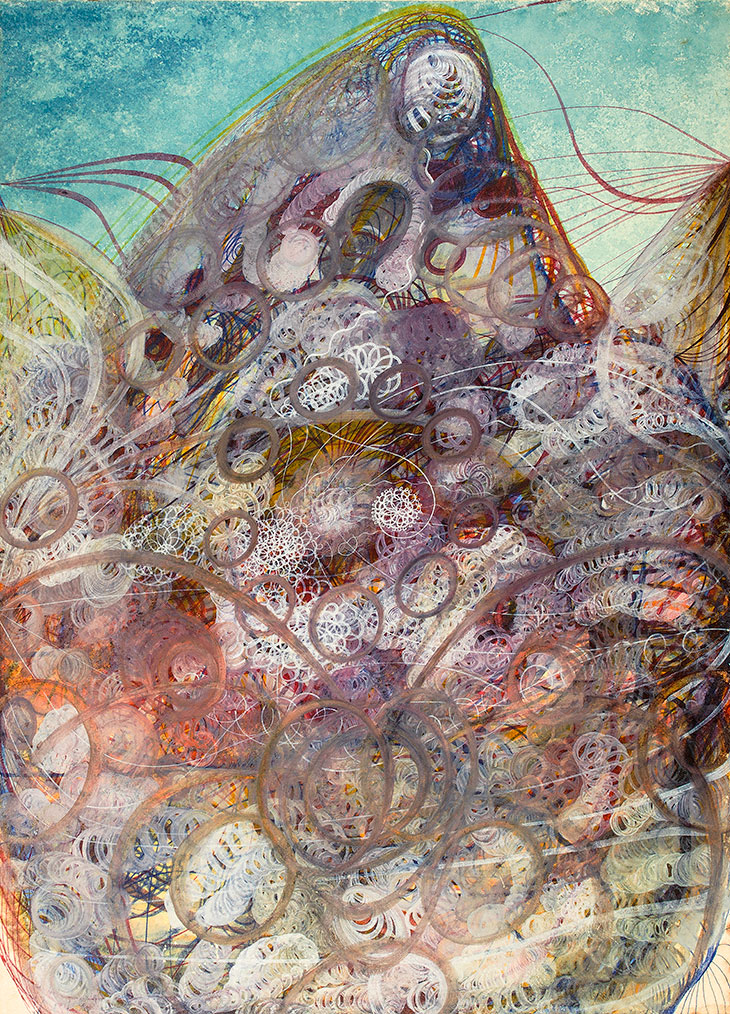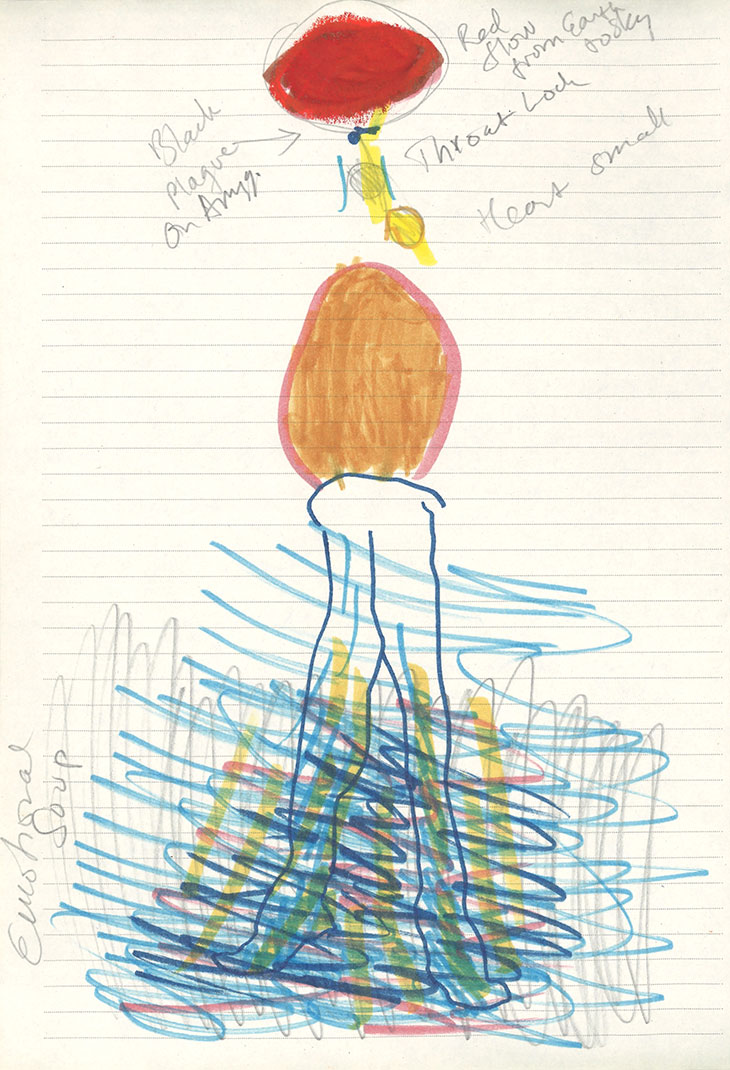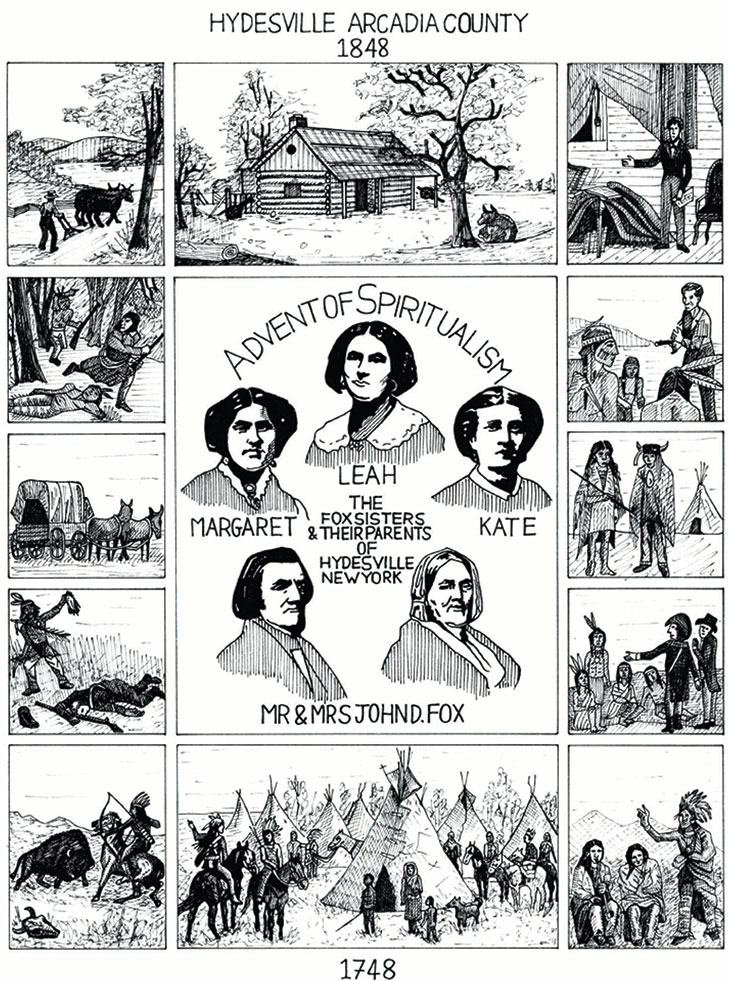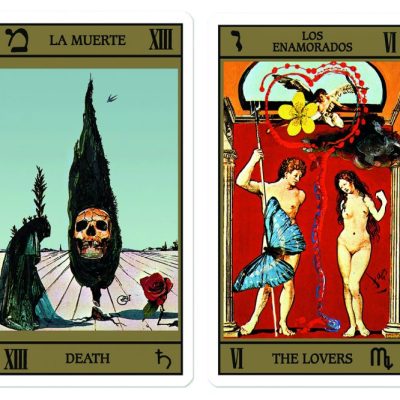On 23 March, Drawing Room in London was set to open ‘Not Without My Ghosts: The Artist as Medium’, co-organised with Hayward Gallery Touring. The show’s roster includes more than 30 artists active over the last 200 years, from historical heavyweights (William Blake) and forgotten pioneers only now gainting traction (Georgiana Houghton) to Surrealists, occultists and contemporary practitioners. Its intention is to take a long view of art’s interest in ‘mediumship’, the practice of bridging the divide between the concrete realm of the living and the unseeable world beyond. The exhibition – and its planned tour to Blackpool, Sheffield and Swansea – has of course been postponed. But, in this period of confusion, it may be apt to turn to the alternate cosmologies of those who seek connection with invisible forces.
Spiritual Crown on Annie Howitt Watts (1867), Georgiana Houghton. Courtesy Vivienne Roberts, London

‘I try to paint into the unknown,’ Ann Churchill tells me over the phone. In Octagonal Drawing (1976) – one of the three pieces she will provide for the show – thick, kaleidoscopic patterns swarm the page, furling to form archetypical symbols: insects, ladders, spiders’ webs, snakes. Like a number of other artists included in the show, Churchill works automatically, making a mark at the middle of the page and allowing her subconscious to guide her hand outwards. Looking at her paintings, I think of something one of the show’s curators, Lars Jakob Bang Larsen, has written in an email: ‘the esoteric wave in art has to do with the ways that social control and political power have become placeless and disembodied under globalisation […] we need images and cognitive maps for this state of affairs.’ Churchill’s images read like maps, only their paths favour freedom over any sense of order.
GL 28 (Emotional Soup) (2016), Pia Lindman. Courtesy the artist

Finnish artist Pia Lindman, who will present six small ‘diagrams’ in pencil and felt tip pen, also works to render the unseeable visible. In GL 28 (Emotional Soup) (2016) a human body has been atomised: its legs a wobbly blue contour, buried under a haze of scribbles; its trunk a rotund shape in orange; its head a levitating, vermillion smudge. Evocative phrases are scrawled across the sheet: ‘Throat Lock’, ‘Heart Small’, ‘Emotional Soup’. The series documents synaesthetic visions witnessed by the artist when healing people. (Her practice fuses various sensory techniques, from the Finnish tradition of Kalevela bone setting to sound and energy healing.) Lindman tells me about her initial scepticism when, during a period of ill health, she first participated in esoteric healing practices (‘I’m a rational being!’), but that they cured her. In contemporary culture faith in the spiritual has been usurped by faith in the scientific method and any deviation from this script is deemed sacrilege. But, in Lindman’s view, science is just another man-made myth, a narrative framework. ‘And it’s not that science is wrong, it’s that this myth is not working.’
A Stellar Key to the Summerland (2007), Olivia Plender. Courtesy the artist

Olivia Plender (who will exhibit three comic books and a photograph) finds herself negotiating a position between being a practitioner of spiritualism and a researcher of its often marginalised histories. ‘Because history is written by the powerful, there are a lot of stories that don’t get told.’ It’s no coincidence that the show is predominantly made up of work by women artists; historically, mediumship has been a way for women to earn a living, use their intellect and express their politics – to ‘carve out space’. Spiritualism is also self-organised and anti-authoritarian, anti-elitist and anti- capitalist: ‘low-fi,’ in Plender’s words. You don’t need much more than a group of friends to practise a seance. When I asked her why she thought there was such a trend for exhibitions focused on mysticism, she says, ‘There’s not only one way of thinking about space, time, death, relations between humans and animals. The Western post-Enlightenment worldview is not the only worldview.’
So, how do the rest of us gain access to unseeable realms? By making maps, interrogating stories, self-organising? Or perhaps there’s a simpler way. ‘When I was a kid, I asked my father, “How do I become magical?”,’ Churchill tells me. His response: ‘Just by breaking habits.’
Drawing Room, London, is temporarily closed to the public due to the Covid-19 outbreak. For more information on ‘Not Without My Ghosts: The Artist as Medium’ visit the institution’s website.


